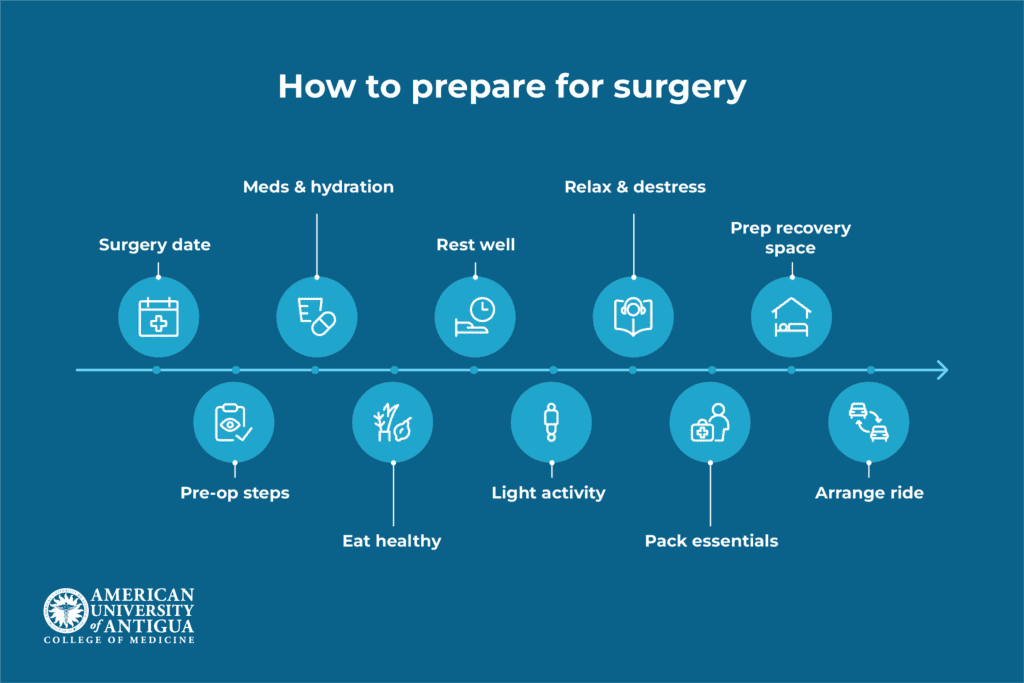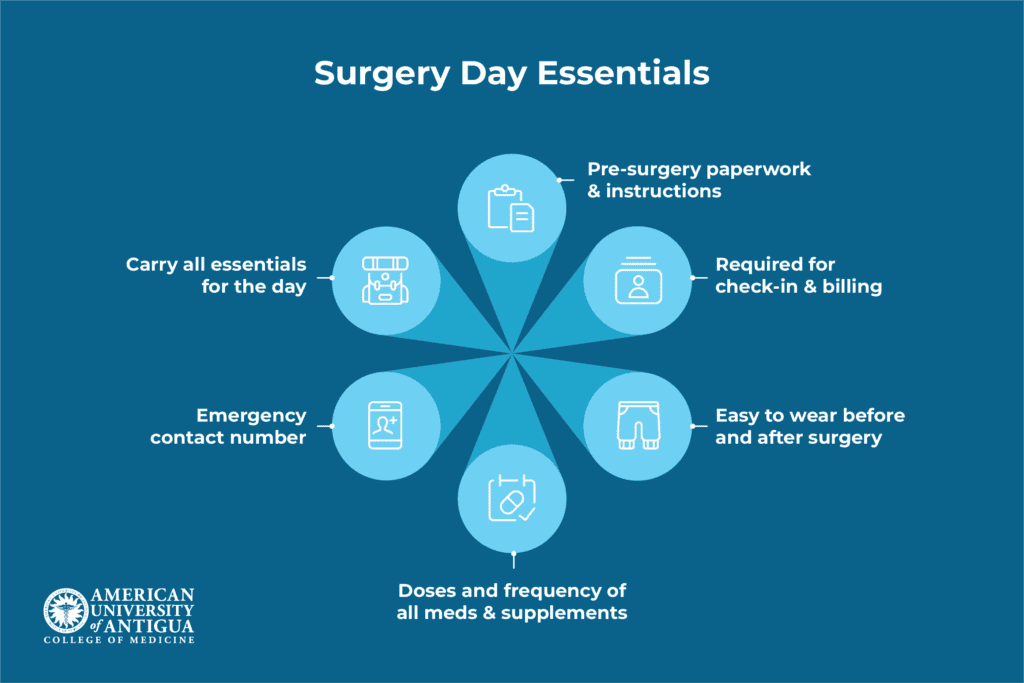How to Prepare for Surgery: Everything You Need to Know
Key Takeaways
- Preparation reduces stress and supports healing: Understanding your procedure and planning ahead can help you stay calm and recover smoothly.
- Follow pre-op instructions carefully: Adhere strictly to guidelines on medications, fasting, and avoiding alcohol or tobacco to ensure safety during surgery.
- Care for your body and mind: Relaxation techniques, a nutritious diet, sufficient rest, and moderate exercise (if allowed) can help your preparation.
- Plan for a smooth recovery: Set up a rest area, get help, prepare meals, and pack essentials to make your surgery day and recovery as easy as possible.
One crucial step that can significantly influence your experience and recovery is getting ready for surgery. Prior to any medical operation, taking the time to prepare yourself may reduce anxiety and uncertainty, helping you feel more calm and confident.
In addition to promoting your body’s healing process, preparation can improve the outcome of surgery. In this guide, you’ll learn everything you need to know, from understanding your procedure to planning for recovery so you can approach surgery with peace of mind.
✅ Request information on AUA's MD program TODAY!
Tips to Prepare for Surgery
Preparing for surgery involves more than just showing up at the hospital on the day of the operation. Below, we’ll go through a few important steps you should take to make sure your body and mind are prepared. Though simple, these tips are vital for a smooth recovery and better outcomes.

Understand your surgery
Before your surgery, it’s very important to know exactly what will happen during the procedure. Having clear, detailed information can help you feel less worried and better prepared. When you talk to your surgeon, make sure to ask important questions, such as why the surgery is needed and what problems it will fix.
Also, ask about the potential risks and the expected benefits. It’s a good idea to learn about the recovery process — how long it may take, what kind of help or care you will need, and if there are any activities or behaviors you should avoid during healing.
Follow pre-op instructions
Adhering strictly to your doctor’s preoperative instructions is essential for a safe and successful surgery. This often includes fasting — refraining from food and drink for a specified period — and may involve stopping or adjusting certain medications.
Avoiding alcohol and smoking in the days leading up to surgery is commonly advised, as these habits may disrupt the effects of anesthesia and slow down the healing process. By strictly adhering to these guidelines, you lower the likelihood of complications and prepare your body for the best possible outcome.
Failure to comply with pre-op instructions can lead to delays or unforeseen issues during surgery.
Prepare your body
Preparing your body in advance can have a significant impact on how well you recover after surgery. To help your body relax and heal, make sure you get enough sleep each night. Maintaining hydration and eating a nutrient-rich diet helps preserve your energy and strengthens your immune system.
If your doctor advises you to stop taking any specific medications of supplements before surgery, be careful to follow their directions precisely. When allowed, light physical activity such as walking or stretching can help preserve your body’s strength and circulation, which may speed up your recovery.
Manage emotional and mental health
Feeling nervous or anxious before surgery is normal. It’s important to address these feelings by talking openly with your doctor, as they can ease your concerns and explain what will occur.
You may also consider reaching out to a therapist or counselor, as they can provide valuable support in managing anxiety. Engaging in practices like deep breathing, mindfulness, or meditation can foster relaxation and help alleviate stress.
Plan for post-surgery recovery
To recover from surgery as quickly as possible, you must prepare your home environment in advance. Create a quiet, cozy area where you can relax and sleep without interruption. Make sure to arrange for someone to drive you home and help you with daily tasks immediately after surgery.
Simple meals can also be prepared in advance, or you can stock up on ready-to-eat food and ensure you have necessary supplies like bandages, prescription medications, and personal hygiene products. Following these steps before surgery can help you recover quickly and minimize stress.
What to Bring on the Day of Surgery
Packing a few essential items can make your surgery day go more smoothly and comfortably.
In order to check in and complete any billing processes, you need to bring your photo ID and health insurance card. Don’t forget to bring any paperwork that was sent to you beforehand by your doctor or the hospital, including consent forms or pre-surgery instructions.

Wear loose, comfortable clothing that’s easy to put on and remove, as you’ll likely need to change into a hospital gown.
Additionally, prepare a comprehensive list of all the drugs, vitamins, and supplements you’re currently taking, together with information on dosages and frequency of usage. This helps medical staff prevent potential drug interactions, reactions, or other problems.
Finally, keep the phone number of a family member or close friend on hand so that medical personnel can contact them with updates while you’re having surgery or in case of an emergency.
Final Checklist Before You Leave Home
Before you leave home for your surgery, it’s a good idea to go through a final checklist to make sure you’re fully prepared. Start by carefully going over all the instructions your doctor gave you.

Double-check the timing for when you’re supposed to stop eating and drinking (fasting), and confirm which medications you should take or skip on the day of your surgery. Following these directions correctly helps keep you safe during the procedure.
To ensure that you get to the hospital or surgical center in time, leave home early. Arriving early gives you enough time to check in, complete necessary paperwork, and ask any last-minute questions without feeling rushed.
Be sure to leave jewelry, body piercings, and valuables at home. Not only are you prohibited from wearing them during surgery, but there’s also a risk they could be lost or misplaced. Taking a few extra minutes to go through this checklist can help you feel more calm, confident, and ready for your surgery day.
Conclusion
Preparing for surgery isn’t just about showing up on the day of the procedure — it’s about taking thoughtful steps in advance to support a smoother experience and better recovery. From understanding your procedure and following your doctor’s instructions to preparing your body and managing your mental health, each part plays a role in helping you feel more confident and ready.
Planning ahead for recovery, packing the right items, and double-checking everything before you leave home can also reduce stress and prevent complications. With the right preparation, you give yourself the best chance at healing well and getting back to your daily life more quickly.
If you’re passionate about healthcare and want to learn more about the path to becoming a skilled, confident physician, take a moment to explore the programs at the American University of Antigua (AUAMED). Just as thoughtful preparation is key to a successful surgery, AUA emphasizes strong foundations and practical training to prepare future doctors for real-world challenges.
Frequently Asked Questions
How long does it take to recover from surgery?
The recovery period differs depending on the type of surgery and your general health — it can take just a few days for minor outpatient procedures or extend to several weeks or even months for more complex surgeries.
What are the risks of not following pre-op instructions?
Failing to follow pre-op guidelines can lead to canceled or delayed procedures or surgeries, increased risk of complications (like infections or anesthesia issues), and delayed healing.
What should I do if I’m sick before my surgery date?
Contact your surgeon or surgical team as soon as possible — they may advise postponing your procedure or provide instructions for managing your illness safely beforehand.
✅ Request information on AUA's MD program TODAY!